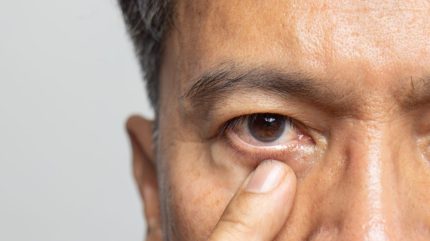
Viridian Therapeutics’s stock has jumped after a Phase III trial of veligrotug met all endpoints and was well tolerated in patients with chronic thyroid eye disease (TED).
The THRIVE-2 (NCT05176639) global Phase III study investigated the intravenously delivered anti-insulin-like growth factor-1 receptor (IGF-1R) antibody in patients with TED. Data presented on Monday (16 December) saw a 56% proptosis responder rate (PRR) and a 2.34mm mean reduction in proptosis in treated patients. The treatment arm also saw a 56% diplopia response rate, with 32% of patients achieving complete resolution of diplopia, compared with 14% of placebo patients.

Discover B2B Marketing That Performs
Combine business intelligence and editorial excellence to reach engaged professionals across 36 leading media platforms.
TED is typically characterised by the growth and inflammation of the muscular tissue behind the eyes, which in turn leads to conditions such as diplopia, known as double vision or proptosis, a bulging of eyes from the sockets.
Steve Mahoney, Viridian’s president and CEO, said: “We are extremely pleased to announce better-than-expected THRIVE-2 results generated in the broadest population of chronic TED patients studied in a global Phase III study to date. We believe that these efficacy and safety results in only five infusions, combined with our compelling data from THRIVE, confirm the potential of veligrotug to be the treatment of choice for all forms of active and chronic TED.
“The robustness and consistency of our data, similar to THRIVE-1, showed strong and rapid responses in categories that we believe matter most to patients including proptosis reduction, diplopia resolution and improvements in Clinical Activity Scores. This is the first product candidate to demonstrate a diplopia response and resolution rate in a global chronic TED Phase III study.”
Following the announcement the company’s stock value jumped more than 20%, going from $17.85 per share at close on Friday (13 December) prior to to the announcement to $21.54 per share at close yesterday. Veligrotug is being investigated in two other trials run by the company, REVEAL-1 (NCT06625411) and REVEAL-2 (NCT06625398), in active and chronic TED respectively. The company has said it hopes to have top-line results for these trials ready by the first half of 2026. It also follows after the company’s THRIVE-1 trial which similarly concluded earlier this year.

US Tariffs are shifting - will you react or anticipate?
Don’t let policy changes catch you off guard. Stay proactive with real-time data and expert analysis.
By GlobalDataTony Casciano, chief commercial officer for Viridian Therapeutics said: “Seeing the strong data presented today demonstrating that diplopia can in fact be improved in patients with long-standing chronic TED is exciting.
“Veligrotug has the potential to be the only approved therapy with data in chronic patients included in the labelling. We believe the strength and completeness of Veligrotug’s pivotal programme, the largest to date in TED, could not only ensure advantageous market access but also expand utilization in patients unaddressed by current therapies.”
Elsewhere in the field of TED, Horizon Therapeutics has announced positive topline results from its Phase IV clinical trial of TEPEZZA to treat adults with chronic conditions.





